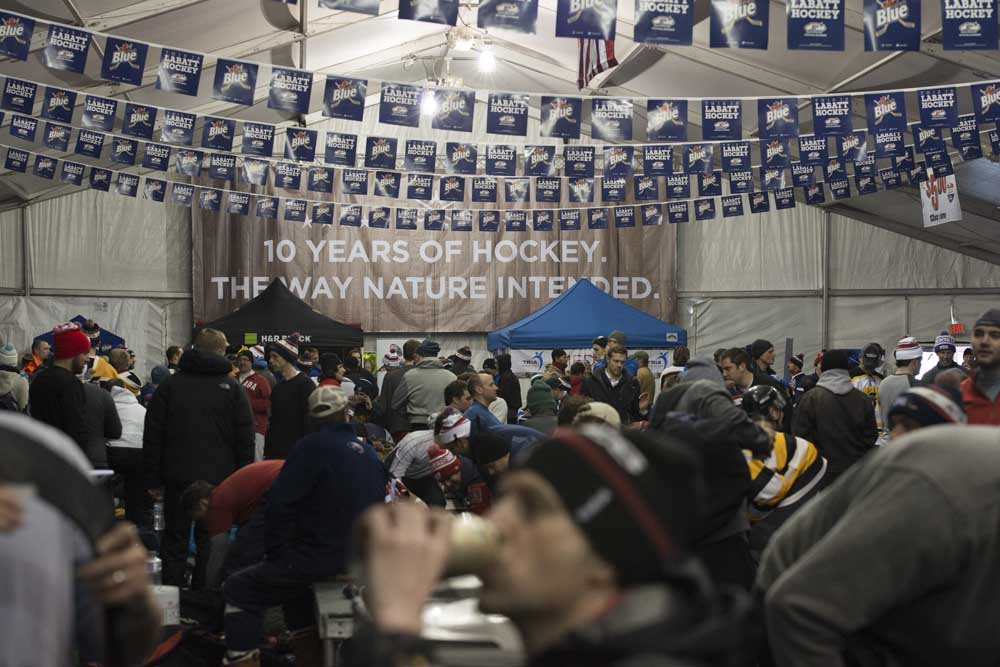No need to be the big fish on the pond
Published 12:18 am Monday, February 9, 2015

- Angela Jimenez/The New York TimesBetween matches, players drink and socialize inside the warming house at the U.S. Pond Hockey Championships, at Lake Nokomis in Minneapolis, Jan. 16, 2015. Once just a curiosity in the United States, pond hockey has twice as many players as a decade ago, and not one but two rival championships, with a third maybe on the horizon.
MINNEAPOLIS — For one long weekend every January, nearly 1,500 men and women in skates converge on frozen Lake Nokomis to revisit their childhoods.
The event, the U.S. Pond Hockey Championships, recalls a simpler time, when children from the Upper Midwest developed their skating and stickhandling skills on wind-swept frozen lakes and backyard rinks, not at indoor complexes with screaming parents.
“We’re celebrating the hockey of our youth,” Carson Kipfer, a tournament co-commissioner, said.
Camaraderie, bragging rights and beer are the primary attractions for a 10-year-old tournament that offers no prize money and only one trophy: the Golden Shovel, an oversize, gold-painted snow shovel on which the names of winning teams are etched.
Last month, swishing skates, clacking sticks and the occasional barking dog provided the soundtrack for 250 teams in six divisions, competing on 25 rinks laid out 50 yards from shore.
The hotly contested open division featured former college players and the occasional retired pro. Curt Wright, a Minnesota State product who has won the open division five times, said he always considered his team the best in the United States.
But in pond hockey, national championships are not so definitive.
USA Hockey, the sport’s American governing body, started its own Pond Hockey National Championships in Eagle River, Wisconsin, in 2006, the same year the Minnesota tournament began. Eagle River now draws more than 300 teams.
So which is the real championship?
USA Hockey sanctions both, having added the Minnesota tournament this year. It also sanctions the Upper Peninsula Pond Hockey Championships in St. Ignace, Michigan, which does not claim to be a national championship, but could. Teams from 45 states have participated since its inception in 2008, said the tournament’s director, Mark Sposito, and 216 teams signed up for this year’s event, which begins Thursday.
Ashley Bevan, USA Hockey’s senior director of adult play, will not take sides.
“I think they’re all great outdoor events,” he said.
USA Hockey officials have discussed creating a definitive national tournament and adding the championship game to the NHL Winter Classic, Bevan said. But numerous logistical questions must be resolved, like where to hold it and who pays for it.
Many pond hockey players and officials add one more question: Why bother? One championship tournament, they fear, might ruin the others. Determining a true champion of pond hockey risks mucking up a good thing.
“It doesn’t matter,” said Fred Haberman, the Minnesota tournament’s founder and a co-commissioner. “Whether it’s your backyard or a tournament with 300 teams, we’re all having a good time. As long as people are going out and being a kid and having fun doing it, you’re a champion. That’s the whole point of it.”
In the past decade, pond hockey has grown from a curiosity into one of hockey’s most popular genres. The success of the World Pond Hockey Championships in Plaster Rock, New Brunswick, which began in 2002 and features teams from Canada, the United States and more than a dozen other countries, inspired similar events in the United States.
USA Hockey does not track pond hockey players specifically, but it said overall adult participation had more than doubled in the past decade, to 167,527 in the 2013-14 season from 75,974 in 2004-05. Labatt, the Canadian brewery, sponsors 13 tournaments in New York, New England and the Midwest.
“This is a question I’m asked a lot: Why do so many people come to play?” Sposito said. “Because they’ve never played outdoors and want to see what it’s like, or they played outdoors and want to do it again.”
Haberman, who still plays in the Minnesota tournament, said, “I wanted to create something that reunites us with friends we played with as kids, unstructured, without the pressure of coaches and parents.”
When he started the event, Haberman said, he never contacted USA Hockey officials, who, unbeknown to him, had the same idea.
Don Kohlman, an influential figure in Wisconsin amateur hockey, learned of USA Hockey’s interest in a pond hockey tournament and pitched Dollar Lake in Eagle River as a site. The tournament grew from 40 teams and 240 players in the first year to 330 teams and 2,300 players for this year’s event, which begins Friday. But poor ice conditions on Dollar Lake forced the tournament to be played on a dry-land site for the first time, said the Eagle River Area fire chief, Pat Weber, the local liaison. Outdoor rinks were constructed at a local track, which normally hosts snowmobile races.
On or off the water, U.S. pond hockey rules differ greatly from rules in college hockey and the NHL. Teams skate four on four, with no goaltenders and a maximum of six or seven players on a roster. Games have two 15-minute halves with a two-minute break in between. Checking and slaps shots are not allowed. There is no icing or offsides. Goals may be scored only from the attacking half of the ice.
Nets vary from tournament to tournament. Minnesota uses wooden boxes made of 2-by-6-inch planks that are 6 feet wide with 12-inch openings on each end. Wisconsin opts for nets, which are 4 feet wide and 6 inches high. Minnesota edges its rinks with 18 inches of hard plastic, but Eagle River prefers small piles of snow. Every spring, Weber said, firefighters retrieve 700 to 800 pucks from the melting snowbanks and donate them to the local hockey association.
Pond hockey also stands out for the whimsical team names etched on its trophies. Minnesota entries included Hat Trick Swayze; He Suits, He Scores, with players in tuxedo T-shirts; Navin R Johnson and the Jerks, a reference to the 1979 film starring Steve Martin; and Vanek! At the Disco, melding Minnesota Wild forward Thomas Vanek with a pop punk band.
Surge Cycling/Red Army, a team of former Division III players that was known for its Russian-lettered uniforms until it picked up a sponsor this year, won the open division of the U.S. Pond Hockey Championships, defeating Old No. 7, 11-7. The thought of one grand championship intrigued the Surge Cycling captain, Jim Fritz, who played at St. John’s in Collegeville, Minnesota. But Fritz, 43, the vice president of a receivables company, said, “I don’t want to travel any farther than this.”
Two of Fritz’s teammates, Josh Edwards and Steve Mulke, voiced concerns about expenses because USA Hockey will not offer prize money.
“I don’t know if it’s worth it,” Mulke said.
Neither does Weber, from the Wisconsin tournament.
“Then it almost comes down to putting us in a position to compete with the others,” he said. “I don’t want to do that. You might want to throw caution to the wind and try to outdo each other.
“There are people who come here every year for the camaraderie. They’ve developed pretty good friendships with teams in their divisions. Hockey takes second for the people who want to be here.”
No need to declare a champion for that.
Many pond hockey players and officials add one more question: Why bother? One championship tournament, they fear, might ruin the others. Determining a true champion of pond hockey risks mucking up a good thing.






